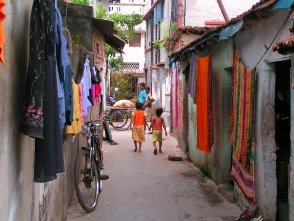“One thing I have asked of the Lord,
That will I seek after:
That I may dwell in the house of the Lord all the days of my life,
To behold the beauty of the Lord
And to inquire in His temple”
Psalm 27:4
For a long time, this has been a favourite verse of mine. What a beautiful place to be, dwelling, resting, in our Lord’s temple, with nothing else to do but enjoy His presence. As a mum of two small children, at first preparing to move and now living in an Asian slum, quite frankly, that rest is fairly inviting.
This invitation of rest and enjoyment of the Lord continues to beckon me further and further into His presence, but more recently I have come to see that rest and peace come from not only seeking His presence, but the reality of actually only having ‘one thing’ to ask of the Lord. As I have reflected, it has become clear to me that although I desired to dwell in the house of the Lord, I am unable to say it is the ‘one thing I ask’. In fact, it is one of many competing things I ask. My actions, decisions and activities are associated with many motivations, usually trying to please people, being impressive and looking good in the eyes of others. Try asking yourself for a day or a week with every new activity ‘what am I really doing this for?’ The answers can be quite revealing. Having our motivation stem from multiple desires or impressing multiple people (spouse, church family, co-workers, boss, even my under privileged neighbours with our simplicity) can make our lives very complex. The peace I'm so desiring moves further and further away.
On the other hand, if we can ground our thoughts and motivation around this one desire…to move continually closer to the presence of God, simplicity and its accompanying inner rest is within our reach. Richard Foster calls this making decisions out of our ‘Divine Centre’ (The Freedom of Simplicity p 99). This doesn’t mean reverting to the life of a monk, that we don’t make further decisions or take on further responsibilities. Rather that when our motivation and thoughts flow out of a desire for an ever closer relationship with our Creator, complexities of purpose and its accompanying time pressures, ego struggles and other things disastrous to inner simplicity can no longer steal us away from the joy that has been promised to us (John 15:11). As far as I can see, God doesn’t promise that a life lived in harmony with Him means less decisions, less external commitments or less busyness although a commitment to move towards a single purpose in him will likely produce this fruit. But it does make decisions easier when one path will lead me further away from His house and another leads me right to His arms.
Quite clearly this conscious decision to simplify the basis of all decisions and actions progresses naturally to a tangible simplicity of lifestyle. When I am no longer in pursuit of security, comfort or an ability to keep up with the Jones, the way is made clear for me to seek the heart of Christ in whichever manner He is inviting me to do so. What is not as obvious, at least at the outset, is the lessons to be learnt from those who have already lead a simple lifestyle not as a conscious decision, but as a necessity.
I am no expert on the topic of simplicity by any stretch of the imagination, but I have tasted enough to know that the things that I have allowed complicate my world, have also held me back from entering into communion with Christ’s heart completely. In my ever evolving journey of simplicity, one way Christ has invited me to know him is through his heart for the poor of this world. And one way he achieves this is giving me my urban poor neighbours as my teachers. Unbeknownst to them, my neighbours challenge me into stripping away things previously known to me as essentials. As a family of four, the children 3 and 2 years, even if we do this radical thing and move to a slum, we couldn’t possibly do it without running water, a flushing toilet, fridge. Or could we? As it turns out we can. It is important to note that for me to live without these things through the luxury of decision means a different thing than my neighbours who struggle with heavy loads of water across a railway track, illness from lack of sanitation and the like out of injustice and lack of opportunity. But in choosing to surrender in solidarity with them, I get closer to knowing and therefore loving the ones forgotten by society, progress, affluence, us, yet not forgotten by God. If I can know the heart of Christ by knowing the ones he looks out for, and if I can do that by living more simply than I ever imagined possible then I can honestly say my neighbours have blessed me more than I them. It is my prayer to somehow repay my debt to them.





